General Discussion
Related: Editorials & Other Articles, Issue Forums, Alliance Forums, Region ForumsGovernment Strategy in 2008 Bank Bailout was to Cover Up the Truth
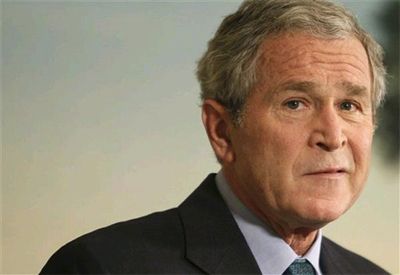
"It’s complicated, and we’re going to make sure whatever we do is done in a deliberative fashion." -- George W Bush, Oct. 3, 2008
Washington's Blog provides details n links:
The Government Lied When It Said It Only Bailed Out Healthy Banks … 12 of the 13 Big Banks Were Going Bust
Posted on January 11, 2013 by WashingtonsBlog
The Government’s Entire Strategy Was to Cover Up the Truth
We noted in 2011 that the Geithner, Bernanke and Paulson lied about the health of the big banks in pitching bailouts to Congress and the American people:
The big banks were all insolvent during the 1980s.
And they all became insolvent again in 2008. See this and this (busted link at WB).
The bailouts were certainly rammed down our throats under false pretenses.
But here’s the more important point. Paulson and Bernanke falsely stated that the big banks receiving Tarp money were healthy, when they were not. They were insolvent.
Tim Geithner falsely stated that the banks passed some time of an objective stress test but they did not. They were insolvent.
CONTINUED...
Who knows? Perhaps some of this information will finally make it into my local noosepaper. For some reason, it hasn't been on the television screen.
nc4bo
(17,651 posts)DUers called it back then, in typical DU style.
So now years later, all the dirt's getting dished ort by ort. Amazing.
And I wonder just exactly what we've done to prevent it from happening again?
Octafish
(55,745 posts)Here's DU and my two-cents:
Know your BFEE: Phil Gramm, the Meyer Lansky of the War Party, Set-Up the Biggest Bank Heist Ever.
The Sting
In the best rip-off, the mark never knows that he or she was set up for fleecing.
In the case of the great financial meltdown of 2008, the victim is the U.S. taxpayer.
Going by the lack of analysis in Corporate McPravda, We the People are in for a royal fleecing.
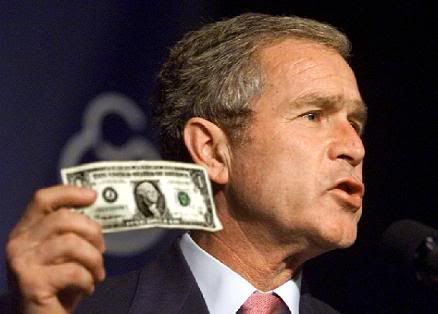
Don’t just take my word about the current situation between giant criminality and the politically connected.
[font color="green"][font size="5"]You see, there is evidence of conspiracy. An honest FBI agent warned us in 2004 about the coming financial meltdown and the powers-that-be stiffed him, too.[/font size][/font color]
The story’s below. And it’s not fiction. It is true to life.
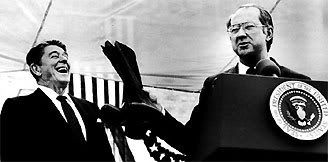
The Set-Up
You don’t have to be a fan of Paul Newman or Robert Redford to smell a BFEE rat. The oily critter’s name is Gramm. Phil Gramm. He helped Ronald Reagan push through his trickle-down fiscal policy and later helped de-regulate the nation's once-healthy Saving & Loan industry. We all know how well that worked out: Know your BFEE: They Looted Your Nation’s S&Ls for Power and Profit.
In 1999, then-super conservative Texas U.S. Senator Gramm helped pass the Gramm-Leach-Bliley Financial Services Modernization Act. This law allowed banks to act like investment houses. Using federally-guaranteed savings accounts, banks now could make risky commercial and real-estate loans.
The law should’ve been called the Gramm-Lansky Act. To those who gave a damn, it was obviously a potential disaster. During the bill’s debate, the specter of a “taxpayer bail-out” was raised by Sen. Byron Dorgan of North Dakota, warning about what had happened to the deregulated S&Ls.
Gramm wasn’t alone on the deregulation bandwagon. The law passed, IIRC, like 89-9. More than a few of my own Democratic faves went along with this deregulation, “get-government-off-the-back-of-business” law.
Today we have their love child, MOAB—for the Mother Of All Bailouts.

The Mark
In a sting, someone has to supply the money to be ripped off. Crooks call that person the mark or target or mope. In the present case, that’s the U.S. taxpayer.
Today’s financial crisis seems like a re-run of what happened to the Savings & Loans industry in the late 1980s. Well it is a lot like what happened to the S&Ls. Then, as now, it’s the U.S. taxpayer who gets to pick up the tab for someone else’s party.
Don’t worry, U.S. taxpayer. You’re getting something (among several things) for your $700 billion. You’re getting all the bad mortgage-based paper on almost all of Wall Street. I’d rather have penny stocks, because if there ever was something of negative value it’s the complicated notes and derivatives based on this mortgage debt.
When it comes to Bush economic policy, left holding the bag are We the People, er, Mopes. Don’t worry, it can’t get worse. As St. Ronnie would say, “Well. Yes.” You see, what the bag U.S. taxpayers hold is less than empty. It’s filled with bad debt.
The Mastermind
Chief economist amongst these merry band of thieves and traitors was one Phil Gramm (once a conservative Democrat and then an ultraconservative Republican-Taxus). An economist by training and reputation, Gramm was one of the guiding lights of Reaganomics, the cut taxes, domestic spending, and regulations while raising defense-spending to new heights. In sum, it was a fiscal policy to enrich friends – especially the kind connected to the BFEE.
Foreclosure Phil
Years before Phil Gramm was a McCain campaign adviser and a lobbyist for a Swiss bank at the center of the housing credit crisis, he pulled a sly maneuver in the Senate that helped create today's subprime meltdown.
David Corn
MotherJones.com
May 28, 2008
Who's to blame for the biggest financial catastrophe of our time? There are plenty of culprits, but one candidate for lead perp is former Sen. Phil Gramm. Eight years ago, as part of a decades-long anti-regulatory crusade, Gramm pulled a sly legislative maneuver that greased the way to the multibillion-dollar subprime meltdown. Yet has Gramm been banished from the corridors of power? Reviled as the villain who bankrupted Middle America? Hardly. Now a well-paid executive at a Swiss bank, Gramm cochairs Sen. John McCain's presidential campaign and advises the Republican candidate on economic matters. He's been mentioned as a possible Treasury secretary should McCain win. That's right: A guy who helped screw up the global financial system could end up in charge of US economic policy. Talk about a market failure.
Gramm's long been a handmaiden to Big Finance. In the 1990s, as chairman of the Senate banking committee, he routinely turned down Securities and Exchange Commission chairman Arthur Levitt's requests for more money to police Wall Street; during this period, the sec's workload shot up 80 percent, but its staff grew only 20 percent. Gramm also opposed an sec rule that would have prohibited accounting firms from getting too close to the companies they audited—at one point, according to Levitt's memoir, he warned the sec chairman that if the commission adopted the rule, its funding would be cut. And in 1999, Gramm pushed through a historic banking deregulation bill that decimated Depression-era firewalls between commercial banks, investment banks, insurance companies, and securities firms—setting off a wave of merger mania.
But Gramm's most cunning coup on behalf of his friends in the financial services industry—friends who gave him millions over his 24-year congressional career—came on December 15, 2000. It was an especially tense time in Washington. Only two days earlier, the Supreme Court had issued its decision on Bush v. Gore. President Bill Clinton and the Republican-controlled Congress were locked in a budget showdown. It was the perfect moment for a wily senator to game the system. As Congress and the White House were hurriedly hammering out a $384-billion omnibus spending bill, Gramm slipped in a 262-page measure called the Commodity Futures Modernization Act. Written with the help of financial industry lobbyists and cosponsored by Senator Richard Lugar (R-Ind.), the chairman of the agriculture committee, the measure had been considered dead—even by Gramm. Few lawmakers had either the opportunity or inclination to read the version of the bill Gramm inserted. "Nobody in either chamber had any knowledge of what was going on or what was in it," says a congressional aide familiar with the bill's history.
It's not exactly like Gramm hid his handiwork—far from it. The balding and bespectacled Texan strode onto the Senate floor to hail the act's inclusion into the must-pass budget package. But only an expert, or a lobbyist, could have followed what Gramm was saying. The act, he declared, would ensure that neither the sec nor the Commodity Futures Trading Commission (cftc) got into the business of regulating newfangled financial products called swaps—and would thus "protect financial institutions from overregulation" and "position our financial services industries to be world leaders into the new century."
Subprime 1-2-3
Don't understand credit default swaps? Don't worry—neither does Congress. Herewith, a step-by-step outline of the subprime risk betting game. —Casey Miner
CONTINUED…
http://www.motherjones.com/news/feature/2008/07/foreclo...
A fine mind for modern Bushonomics. Kill the middle class. Then, rob from the poor to give to the rich.
The Mentor
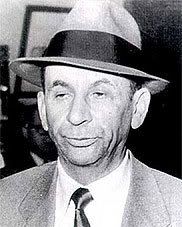
Anyone who’s ever heard him talk knows that Gramm must’ve learned all this stuff from somebody. He could never think it all up on his own. He had to have help. That’s where Meyer Lansky, the man who brought modern finance to the Mafia, comes in.
Money Laundering
Answers.com
EXCERPT...
History
Modern development
The act of "money laundering" was not invented during the Prohibition era in the United States, but many techniques were developed and refined then. Many methods were devised to disguise the origins of money generated by the sale of then-illegal alcoholic beverages. Following Al Capone's 1931 conviction for tax evasion, mobster Meyer Lansky transferred funds from Florida "carpet joints" (small casinos) to accounts overseas. After the 1934 Swiss Banking Act, which created the principle of bank secrecy, Meyer Lansky bought a Swiss bank to which he would transfer his illegal funds through a complex system of shell companies, holding companies, and offshore accounts.(1)
The term "money laundering" does not derive, as is often said, from Al Capone having used laundromats to hide ill-gotten gains. It was Meyer Lansky who perfected money laundering's older brother, "capital flight," transferring his funds to Switzerland and other offshore places. The first reference to the term "money laundering" itself actually appears during the Watergate scandal. US President Richard Nixon's "Committee to Re-elect the President" moved illegal campaign contributions to Mexico, then brought the money back through a company in Miami. It was Britain's Guardian newspaper that coined the term, referring to the process as "laundering."
Process
Money laundering is often described as occurring in three stages: placement, layering, and integration.(3)
Placement: refers to the initial point of entry for funds derived from criminal activities.
Layering: refers to the creation of complex networks of transactions which attempt to obscure the link between the initial entry point, and the end of the laundering cycle.
Integration: refers to the return of funds to the legitimate economy for later extraction.
However, The Anti Money Laundering Network recommends the terms
Hide: to reflect the fact that cash is often introduced to the economy via commercial concerns which may knowingly or not knowingly be part of the laundering scheme, and it is these which ultimately prove to be the interface between the criminal and the financial sector
Move: clearly explains that the money launderer uses transfers, sales and purchase of assets, and changes the shape and size of the lump of money so as to obfuscate the trail between money and crime or money and criminal.
Invest: the criminal spends the money: he/she may invest it in assets, or in his/her lifestyle.
CONTINUED...
http://www.answers.com/topic/money-laundering
The great journalist Lucy Komisar has shone a big light on the subject:
Offshore Banking
The U.S.A.’s Secret Threat
Lucy Komisar
The Blacklisted Journalist
June 1, 2003
EXCERPT…
In 1932, mobster Meyer Lansky took money from New Orleans slot machines and shifted it to accounts overseas. The Swiss secrecy law two years later assured him of G-man-proof banking. Later, he bought a Swiss bank and for years deposited his Havana casino take in Miami accounts, then wired the funds to Switzerland via a network of shell and holding companies and offshore accounts, some of them in banks whose officials knew very well they were working for criminals. By the 1950s, Lansky was using the system for cash from the heroin trade.
Today, offshore is where most of the world's drug money is laundered, estimated at up to $500 billion a year, more than the total income of the world's poorest 20 percent. Add the proceeds of tax evasion and the figure skyrockets to $1 trillion. Another few hundred billion come from fraud and corruption.
Lansky laundered money so he could pay taxes and legitimate his spoils. About half the users of offshore have opposite goals. As hotel owner and tax cheat Leona Helmsley said---according to her former housekeeper during Helmsley's trial for tax evasion---"Only the little people pay taxes." Rich individuals and corporations avoid taxes through complex, accountant-aided schemes that routinely use offshore accounts and companies to hide income and manufacture deductions.
The impact is massive. The IRS estimates that taxpayers fail to pay in excess of $100 billion in taxes annually due on income from legal sources. The General Accounting Office says that American wage-earners report 97 percent of their wages, while self-employed persons report just 11 percent of theirs. Each year between 1989 and 1995, a majority of corporations, both foreign- and U.S.-controlled, paid no U.S. income tax. European governments are fighting the same problem. The situation is even worse in developing countries.
The issue surfaces in the press when an accounting scam is so outrageous that it strains credulity. Take the case of Stanley Works, which announced a "move" of its headquarters-on paper-from New Britain, Connecticut, to Bermuda and of its imaginary management to Barbados. Though its building and staff would actually stay put, manufacturing hammers and wrenches, Stanley Works would no longer pay taxes on profits from international trade. The Securities and Exchange Commission, run by Harvey Pitt---an attorney who for more than twenty years represented the top accounting and Wall Street firms he was regulating---accepted the pretense as legal.
"The whole business is a sham," fumed New York District Attorney Robert Morgenthau, who more than any other U.S. law enforcer has attacked the offshore system. "The headquarters will be in a country where that company is not permitted to do business. They're saying a company is managed in Barbados when there's one meeting there a year. In the prospectus, they say legally controlled and managed in Barbados. If they took out the word legally, it would be a fraud. But Barbadian law says it's legal, so it's legal." The conceit apparently also persuaded the Securities and Exchange Commission.
CONTINUED…
http://www.bigmagic.com/pages/blackj/column92e.html
Socialize the risk for Wall Street. Privatize the loss to Uncle Sam’s nieces and nephews. Congratulations, Dear Reader! Now you know as much as Phil Gramm.
The Diversion
Still, a global financial meltdown sounds like something bad. Making things worse, we’re hearing that Uncle Sam is broke! Flat busted. Tapped out.
That’s odd, though. We the People see the Treasury being emptied with tax breaks for the wealthy and checks to the companies they own that make money off of war. Want to know how to make a buck these days? Invest in the likes of Halliburton and Northrup Grumman. Anything in the warmongering business connected to Bush and his cronies will weather the downturn or depression.
The Wall Street Journal -- a paper owned and operated by Fox News’ head, Rupert Murdoch – was very quick to promote the crisis, as DUer JustPlainKathy observed. The paper was even faster to pounce on a solution: What’s needed is a safety net for banks. And quick as a wink, they found the answer!
Only the U.S. taxpayer has the wherewithal to prevent the collapse of the global financial system -- a global economic meltdown that would freeze up credit and investment and expansion and prosperity and a return to the Great Depression. Who can be against that?
Oh. Kay. Sounds about right – Rupert the Alien agreeing with what Leona Helmsley said: “Only the little people pay taxes.”
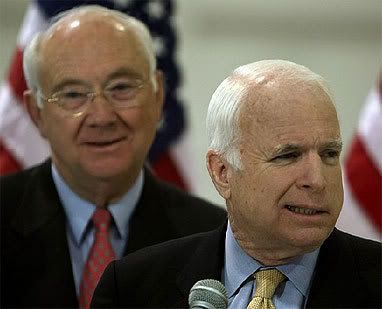
Gramm and McCain also are in favor of privatization. How nice is that?
The Getaway
George Walker Bush and his right-wing pals feel they can get away with this, their latest rip-off the American taxpayers. Who can blame them? When compared to their clear record of incompetence, lies, fraud, theft, mass-murder, warmongering and treason, what’s a few trillion dollar rip-off?

Still, it's weird how they act.
They must really think they’ll be welcomed with open arms in Paraguay and Dubai and Switzerland.
Going by the welcome the world gave the Shah of Iran, they’re in for a big surprise.
The FBI Guy
Don’t say we weren’t warned. An intrepid FBI agent with something sorely lacking in the rest of the Bush administration, integrity, blew the whistle on the bank thing…
FBI saw threat of mortgage crisis
A top official warned of widening loan fraud in 2004, but the agency focused its resources elsewhere.
By Richard B. Schmitt
Los Angeles Times Staff Writer
August 25, 2008
WASHINGTON — Long before the mortgage crisis began rocking Main Street and Wall Street, a top FBI official made a chilling, if little-noticed, prediction: The booming mortgage business, fueled by low interest rates and soaring home values, was starting to attract shady operators and billions in losses were possible.
"It has the potential to be an epidemic," Chris Swecker, the FBI official in charge of criminal investigations, told reporters in September 2004. But, he added reassuringly, the FBI was on the case. "We think we can prevent a problem that could have as much impact as the S&L crisis," he said.
Today, the damage from the global mortgage meltdown has more than matched that of the savings-and-loan bailouts of the 1980s and early 1990s. By some estimates, it has made that costly debacle look like chump change. But it's also clear that the FBI failed to avert a problem it had accurately forecast.
Banks and brokerages have written down more than $300 billion of mortgage-backed securities and other risky investments in the last year or so as homeowner defaults leaped and weakness in the real estate market spread.
SNIP…
Most observers have declared the mess a gross failure of regulation. To be sure, in the run-up to the crisis, market-oriented federal regulators bragged about their hands-off treatment of banks and other savings institutions and their executives. But it wasn't just regulators who were looking the other way. The FBI and its parent agency, the Justice Department, are supposed to act as the cops on the beat for potentially illegal activities by bankers and others. But they were focused on national security and other priorities, and paid scant attention to white-collar crimes that may have contributed to the lending and securities debacle.
Now that the problems are out in the open, the government's response strikes some veteran regulators as too little, too late.
Swecker, who retired from the FBI in 2006, declined to comment for this article.
But sources familiar with the FBI budget process, who were not authorized to speak publicly about the growing fraud problem, say that he and other FBI criminal investigators sought additional assistance to take on the mortgage scoundrels.
They ended up with fewer resources, rather than more.
CONTINUED…
http://www.latimes.com/business/la-fi-mortgagefraud25-2008aug25,0,6946937.story
We were warned and nothing happened.
Repeat: And nothing happened.
They must think We the People are really stupid. Are we supposed to believe that all that $700 billion in bad debt just happened? Where did all that money go? Who got all the money?
Meyer Lansky moved the Mafia’s money from the Cuban casinos to Switzerland. He did so by buying a bank in Miami. Phil Gramm seems to have done the same thing as vice-chairman of UBS, except the amounts are in the billions.
Who cares? He’s almost gone? Nope. That money still exists somewhere. I have a pretty good idea of where it might be. And George Bush and his cronies are poised to get away with a whole lot of loot.
Who Should Pay for the Bailout
If you are fortunate enough to be one, good luck American taxpayer! You’re in for a royal fleecing. Once the interest is figured into the bailout, we’re looking at a couple of trill.
The people who should pay for the bailout aren’t the American people. That distinction should go to the crooks who stole it -- friends of Gramm like John McCain and George Bush and the rest of the Raygunomix crowd of snake-oil salesmen. For them, the Bush administration -- and a good chunk of time since Ronald Reagan -- has not been a disaster. It’s been a cash cow.
The above was posted on DU on Sept. 21, 2008. Lots of info from DUers.
As you ask, nc4bo: What's changed to protect we the taxpaying mopes since then?
http://www.democraticunderground.com/discuss/duboard.php?az=view_all&address=389x4055207
nc4bo
(17,651 posts)for whatever reason, I misplaced my link.
It's huge, was then still is now and yet, we have plankton-brained folks more worried about someone selling $50 off a food stamp card then some of the biggest, ugliest thefts of our time.
SMDH at the insanity of it all.
hootinholler
(26,449 posts)Funny how the bogus robosigned foreclosures are proceeding unabated as well. So not only did the banksters rip off the treasury, they are reaping a windfall of real property as well.
dixiegrrrrl
(60,010 posts)President Clinton.
Also signed NAFTA.
Downwinder
(12,869 posts)Autumn
(45,120 posts)These fucking banks are going to need another bail out soon. They are still playing the game and no one is going to stop them. In fact, most of the people in charge are going to give them a hand with it.
![]() Just for my first sentence.
Just for my first sentence. ![]() the rest of it I am dead ass serious. It will happen again
the rest of it I am dead ass serious. It will happen again
Octafish
(55,745 posts)Washington's Blog does remind us about who foamed the runway:
Proof Positive that Government’s “Homeowner Relief” Programs Are Disguised Bank Bailouts … Not Even AIMED at Helping Homeowners
Posted on August 16, 2012 by WashingtonsBlog
Government Was Just Trying to “Foam the Runway” to Help Giant Banks
We pointed out last year:
Huffington Post notes, in a story entitled “New Obama Foreclosure Plan Helps Banks At Taxpayers’ Expense “:
A key new condition in the plan would shift the financial liability for refinanced loans from Wall Street banks to the American taxpayer.
***
The newly expanded program would expunge legal liabilities associated with mortgages refinanced through the program for the original lenders of the mortgages. Each time a bank sent a loan to Fannie and Freddie, it certified that the loan met Fannie and Freddie’s safe lending criteria. But many loans sent to the mortgage giants did not, in fact, meet those criteria. Currently, when borrowers default on those ineligible loans, the mortgage giants can “put back” the resulting losses onto the banks that pushed the loans.
Under the modified plan, “put back” liability at banks will be erased for any underwater mortgage that is refinanced through HARP, eliminating Fannie and Freddie’s ability to sack lenders with losses in the event that the mortgage does not pan out.
If borrowers go through HARP, but decide after several months that the modest monthly savings do not outweigh owing tens of thousands of dollars more than their home is worth, taxpayer-owned Fannie and Freddie will have to take the full loss. Even if the original loan was sent to Fannie and Freddie with false or fraudulent guarantees from the bank — promises that may directly be tied to the borrower’s current financial problems — banks will be immune from liability. Fannie and Freddie plan to charge banks “a modest fee” to extinguish this liability, but the administration has yet to determine what that fee will be.
“In most cases people would probably be better off walking,” said economist Dean Baker, co-director of the Center for Economic Policy and Research.
CONTINUED...w links:
http://www.washingtonsblog.com/2012/08/proof-positive-that-governments-homeowner-relief-programs-are-really-aid-to-banks-and-not-aimed-at-helping-homeowners.html
Geithner foamed the runway to save the banks.
Downwinder
(12,869 posts)interest from the FED, I could loan it at a profit like the banks do. I am sure I can operate at a lower overhead than they do. .I grew up with Robert Hall commercials, I know the rhyme.
Octafish
(55,745 posts)We could get dressed up...
The Real Housewives of Wall Street
Why is the Federal Reserve forking over $220 million in bailout money to the wives of two Morgan Stanley bigwigs?
By Matt Taibbi
April 12, 2011 9:55 AM ET
EXCERPT...
But if you want to get a true sense of what the "shadow budget" is all about, all you have to do is look closely at the taxpayer money handed over to a single company that goes by a seemingly innocuous name: Waterfall TALF Opportunity. At first glance, Waterfall's haul doesn't seem all that huge — just nine loans totaling some $220 million, made through a Fed bailout program. That doesn't seem like a whole lot, considering that Goldman Sachs alone received roughly $800 billion in loans from the Fed. But upon closer inspection, Waterfall TALF Opportunity boasts a couple of interesting names among its chief investors: Christy Mack and Susan Karches.
Christy is the wife of John Mack, the chairman of Morgan Stanley. Susan is the widow of Peter Karches, a close friend of the Macks who served as president of Morgan Stanley's investment-banking division. Neither woman appears to have any serious history in business, apart from a few philanthropic experiences. Yet the Federal Reserve handed them both low-interest loans of nearly a quarter of a billion dollars through a complicated bailout program that virtually guaranteed them millions in risk-free income.
SNIP...
In the case of Waterfall TALF Opportunity, here's what we know: The company was founded in June 2009 with $14.87 million of investment capital, money that likely came from Christy Mack and Susan Karches. The two Wall Street wives then used the $220 million they got from the Fed to buy up a bunch of securities, including a large pool of commercial mortgages managed by Credit Suisse, a company John Mack once headed. Those securities were valued at $253.6 million, though the Fed refuses to explain how it arrived at that estimate. And here's the kicker: Of the $220 million the two wives got from the Fed, roughly $150 million had not been paid back as of last fall — meaning that you and I are still on the hook for most of whatever the Wall Street spouses bought on their government-funded shopping spree.
The public has no way of knowing how much Christy Mack and Susan Karches earned on these transactions, because the Fed has repeatedly declined to provide any information about how it priced the individual securities bought as part of programs like TALF. In the Waterfall deal, for instance, we know the Fed pledged some $14 million against a block of securities called "Credit Suisse Commercial Mortgage Trust Series 2007-C2" — but that data is meaningless without knowing how many units were bought. It's like saying the Fed gave Waterfall $14 million to buy cars. Did Waterfall pay $5,000 per car, or $500,000? We have no idea. "There's no way of validating or invalidating the Fed's process in TALF without this pricing information," says Gary Aguirre, a former SEC official who was fired years ago after he tried to interview John Mack in an insider-trading case.
In early April, in an attempt to learn exactly how much Mack and Karches made on the TALF deals, Sen. Chuck Grassley of Iowa wrote a letter to Waterfall asking 21 detailed questions about the transactions. In addition, Sen. Sanders has personally asked Fed chief Bernanke to provide more complete information on the TALF loans given not only to Christy Mack but to gazillionaires like former Miami Dolphins owner H. Wayne Huizenga and hedge-fund shark John Paulson. But Bernanke bluntly refused to provide the information — and the Fed has similarly stonewalled other oversight agencies, including the General Accounting Office and TARP's special inspector general.
CONTINUED...
http://www.rollingstone.com/politics/news/the-real-housewives-of-wall-street-look-whos-cashing-in-on-the-bailout-20110411
Everybody's doing it -- in D.C., that is:
Federal Reserve Directors Banks and Businesses Took 4 Trillion in Bailouts - Sanders FED Audit
Response to Octafish (Original post)
nc4bo This message was self-deleted by its author.
ChisolmTrailDem
(9,463 posts)Nothing will ever be done about it and it will happen again and our taxpayer funds will be stolen to cover it again and again and again because not a single thing will be done about it through our justice system nor through popular movements.
Octafish
(55,745 posts)Then, I remember why I'm a Democrat and that united we can do anything.
What Matt Taibbi found:
Secrets and Lies of the Bailout
The federal rescue of Wall Street didn’t fix the economy – it created a permanent bailout state based on a Ponzi-like confidence scheme. And the worst may be yet to come
Matt Taibbi
Rolling Stone, Jan. 4, 2013
EXCERPT...
THEY LIED ABOUT THE BAILOUT BEING TEMPORARY
The bailout ended up being much bigger than anyone expected, expanded far beyond TARP to include more obscure (and in some cases far larger) programs with names like TALF, TAF, PPIP and TLGP. What's more, some parts of the bailout were designed to extend far into the future. Companies like AIG, GM and Citigroup, for instance, were given tens of billions of deferred tax assets – allowing them to carry losses from 2008 forward to offset future profits and keep future tax bills down. Official estimates of the bailout's costs do not include such ongoing giveaways. "This is stuff that's never going to appear on any report," says Barofsky.
Citigroup, all by itself, boasts more than $50 billion in deferred tax credits – which is how the firm managed to pay less in taxes in 2011 (it actually received a $144 million credit) than it paid in compensation that year to its since-ousted dingbat CEO, Vikram Pandit (who pocketed $14.9 million). The bailout, in short, enabled the very banks and financial institutions that cratered the global economy to write off the losses from their toxic deals for years to come – further depriving the government of much-needed tax revenues it could have used to help homeowners and small businesses who were screwed over by the banks in the first place.
Even worse, the $700 billion in TARP loans ended up being dwarfed by more than $7.7 trillion in secret emergency lending that the Fed awarded to Wall Street – loans that were only disclosed to the public after Congress forced an extraordinary one-time audit of the Federal Reserve. The extent of this "secret bailout" didn't come out until November 2011, when Bloomberg Markets, which went to court to win the right to publish the data, detailed how the country's biggest firms secretly received trillions in near-free money throughout the crisis.
Goldman Sachs, which had made such a big show of being reluctant about accepting $10 billion in TARP money, was quick to cash in on the secret loans being offered by the Fed. By the end of 2008, Goldman had snarfed up $34 billion in federal loans – and it was paying an interest rate of as low as just 0.01 percent for the huge cash infusion. Yet that funding was never disclosed to shareholders or taxpayers, a fact Goldman confirms. "We did not disclose the amount of our participation in the two programs you identify," says Goldman spokesman Michael Duvally.
Goldman CEO Blankfein later dismissed the importance of the loans, telling the Financial Crisis Inquiry Commission that the bank wasn't "relying on those mechanisms." But in his book, Bailout, Barofsky says that Paulson told him that he believed Morgan Stanley was "just days" from collapse before government intervention, while Bernanke later admitted that Goldman would have been the next to fall.
Meanwhile, at the same moment that leading banks were taking trillions in secret loans from the Fed, top officials at those firms were buying up stock in their companies, privy to insider info that was not available to the public at large. Stephen Friedman, a Goldman director who was also chairman of the New York Fed, bought more than $4 million of Goldman stock over a five-week period in December 2008 and January 2009 – years before the extent of the firm's lifeline from the Fed was made public. Citigroup CEO Vikram Pandit bought nearly $7 million in Citi stock in November 2008, just as his firm was secretly taking out $99.5 billion in Fed loans. Jamie Dimon bought more than $11 million in Chase stock in early 2009, at a time when his firm was receiving as much as $60 billion in secret Fed loans. When asked by Rolling Stone, Chase could not point to any disclosure of the bank's borrowing from the Fed until more than a year later, when Dimon wrote about it in a letter to shareholders in March 2010.
The stock purchases by America's top bankers raise serious questions of insider trading. Two former high-ranking financial regulators tell Rolling Stone that the secret loans were likely subject to a 1989 guideline, issued by the Securities and Exchange Commission in the heat of the savings and loan crisis, which said that financial institutions should disclose the "nature, amounts and effects" of any government aid. At the end of 2011, in fact, the SEC sent letters to Citigroup, Chase, Goldman Sachs, Bank of America and Wells Fargo asking them why they hadn't fully disclosed their secret borrowing. All five megabanks essentially replied, to varying degrees of absurdity, that their massive borrowing from the Fed was not "material," or that the piecemeal disclosure they had engaged in was adequate. Never mind that the law says investors have to be informed right away if CEOs like Dimon and Pandit decide to give themselves a $10,000 raise. According to the banks, it's none of your business if those same CEOs are making use of a secret $50 billion charge card from the Fed.
The implications here go far beyond the question of whether Dimon and Co. committed insider trading by buying and selling stock while they had access to material nonpublic information about the bailouts. The broader and more pressing concern is the clear implication that by failing to act, federal regulators have tacitly approved the nondisclosure. Instead of trusting the markets to do the right thing when provided with accurate information, the government has instead channeled Jack Nicholson – and decided that the public just can't handle the truth.
CONTINUED...
http://www.rollingstone.com/politics/news/secret-and-lies-of-the-bailout-20130104?print=true
Seeing how Corporate McPravda doesn't want the nation to know, it's up to us to spread the news -- which is why the Bill of Rights puts freedom of speech and of the press at the top of the stack.
marions ghost
(19,841 posts)Berlum
(7,044 posts)Freaking chickenhawk republicans and their AWOL proclivities...pathetic.
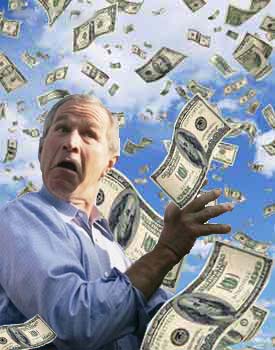
Octafish
(55,745 posts)Know your BFEE
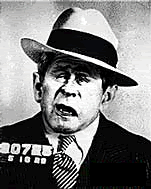
They Looted Your Nation’s S&Ls for Power and Profit
http://www.democraticunderground.com/discuss/duboard.php?az=view_all&address=389x2922138
"Yeah. It was dry run, see?"
Follow The Money
(141 posts)Banks took all the money in fees, failed to help anyone, told homeowners they had 2 days to make all their back payments and kicked them out anyway.
Also, a ton of HAMP money went to the corporate media for ads, saw them all the time on DU, heard them all the time on right wing radio too. Not Cool.
Now since HAMP failed, there is HARP, probably doing the exact same thing.
Meanwhile robosigning is now a small fine, and millions more foreclosures are coming with no help in sight.
And in some situations, the banks failed to actually foreclose, and now they are killing people...
Rise of the Zombie Title: Thousands of homeowners legally liable for houses that were seized by bank
http://www.dailymail.co.uk/news/article-2260201/Zombie-foreclosures-Homeowners-legally-liable-houses-seized-banks-foreclosed.html
Five years ago, Keller, 10 months behind on his mortgage payments, received notice of a foreclosure judgment from JP Morgan Chase. In a few weeks, the bank said, his three-story house with gray vinyl siding in Columbus, Ohio, would be put up for auction at a sheriff's sale. The 58-year-old former social worker and his wife, Jennifer, packed up their home of 13 years and moved in with their daughter. Joseph thought he would never have anything to do with the house again. And for about a year, he didn't. Then it started to stalk him.
First, in 2010, the county sued Keller because the house, already picked clean by scavengers, was in a shambles, its hanging gutters and collapsed garage in violation of local housing code.Then the tax collector started sending Keller notices about mounting back taxes, sewer fees and bills for weed and waste removal. And last year, Chase's debt collector began pressing Keller to pay his mortgage, which had swollen, with penalties and fees, from $62,100.27 to $84,194.69.
The worst news came last January, when the Social Security Administration rejected Keller's application for disability benefits; the 'asset' on Avondale Avenue rendered him ineligible. Keller's medical problems include advanced liver disease, hepatitis C and inactive tuberculosis. Without disability coverage, he can't get the liver transplant he needs to stay alive.
At some point we are going to have to hold ourselves accountable here.
We are all just watching this rape and looting and just hoping someone else will do something.
Bystander effect.
Bankers have indicated they have no intention of stopping this theft and lies, we are going to have to do something to stop them.
Octafish
(55,745 posts)As is SOP, the banksters got bonuses. The people got to hold the bag.
Geithner's New York Fed Pushed AIG to Keep Sweetheart Deals Secret
http://www.democraticunderground.com/discuss/duboard.php?az=view_all&address=389x7415822
Thank you very much for the heads-up on Mr. Keller, Follow The Money. My heart is broken for him and the millions who lost their homes.
Fire Walk With Me
(38,893 posts)Octafish
(55,745 posts)Simon English
The Independent, Jan. 14, 2013
The great vampire squid’s move to even consider delaying bonus payments to some of its staff just to save them a few quid in tax indicates that it continues to live in a separate world to the rest of us.
More than that, it lives in a world beyond even most other powerful banks. Early reports on the matter said that other large finance firms had wondered whether they should wait for the tax rate to drop from 50% to 45% before paying out bonuses and quickly decided that it would look bad.
That’s a move forward, for an industry that has persistently decided that following the law is all that can be expected of it; actually doing the right thing is not in its remit.
SNIP...
Perhaps the bank even meant it when it said it, but plainly this desire to do God’s work didn’t last long. The wider context is huge public fury at the ability of large corporations and rich individuals to skirt rules that apply steadfastly to everyone else.
CONTINUED...
http://www.independent.co.uk/news/business/comment/simon-english-memo-to-goldman-sachs-this-is-partly-why-people-hate-you-8451470.html
Sickeningly true, all that rot, wot?
bvar22
(39,909 posts)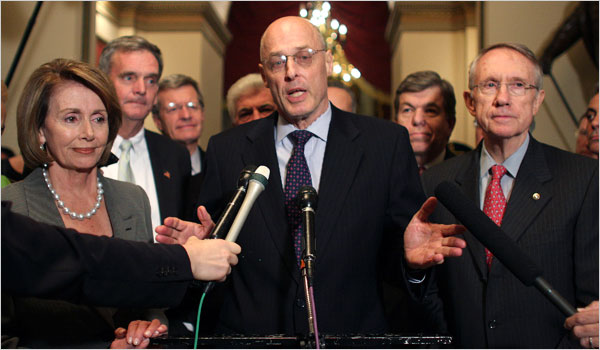
In a shameful display of Bi-Partisan harmony not often witnessed in Washington,
Democrats joined with Republicans to protect their Investment Portfolios.
It took them less than a week to hand over a $TRILLION DOLLARS to the Wall Street Bankers
after receiving a 3 page Extortion Note that threatened a modest loss to the stock holdings of those with investments in the Big Banks.
For those Americans suffering from the delusion that Washington is too monolithic,
too partisan, or too bureaucratic to act quickly,
let this forever put that myth to rest.
Washington can strike faster than a rattlesnake
if their personal profits are threatened.
You will know them by their WORKS,
not by their rhetoric, promises, or excuses.
[font size=5 color=green]Solidarity99![/font][font size=2 color=green]
--------------------------------------------------------------------------------------------------------------------------------[/center]
Hotler
(11,445 posts)Octafish
(55,745 posts)What Robert Scheer wrote:
Bill Clinton: The Great Deregulator
by Robert Scheer
Published on Monday, September 10, 2012 by TruthDig.com
Bill Clinton bears as much responsibility as any politician for the worst economic crisis since the Great Depression, and the wild applause for his disingenuous speech at the Democratic National Convention last week is a sure sign of the poverty of what passes for progressive politics.
Do those convention delegates, and the fawning media that were wowed by the former president’s rhetorical seductions, not recall that just before he left office Clinton signed off on the game-changing legislation that ended the sensible rules imposed on Wall Street during the Great Depression? It was Clinton who cooperated with the Republicans in reversing the legacy of FDR’s New Deal, opening the floodgates of unfettered avarice that almost drowned the world’s economy during the reign of George W. Bush.
How convenient to ignore the Financial Services Modernization Act, which Clinton signed into law to summarily end the Glass-Steagall barrier against the commingling of investment and commercial banking. Do the Democrats not remember that Citigroup, the first too-big-to-fail bank made legal by the law Clinton signed, became the $15 million employer of Robert Rubin, the Clinton treasury secretary who led the fight for the law that legalized the creation of Citigroup? Or that Citigroup—led by Sanford Weill, to whom Clinton gave one of the souvenir pens he used to approve that onerous legislation—went on to be a major player in the subprime mortgage swindles and had to be bailed out with more than $50 billion of taxpayer funds?
Those scams were based on bundling suspect mortgages into collateralized debt obligations (CDOs), backed by the phony insurance of credit default swaps (CDSs), all of which were given “legal certainty,” to quote Lawrence Summers, who replaced Rubin as Clinton’s treasury secretary. It was Summers who encouraged Clinton to sign the Commodity Futures Modernization Act, which declared CDOs and CDSs immune to any existing regulatory law and the purview of any regulatory agency.
SNIP...
The Democrats who boast so much about their inclusion of black and brown people have not seemed to notice that the accumulated wealth of both groups has declined by more than half since the onset of this crisis, wiping out much of the economic gains of the civil rights movement.
CONTINUED...
http://www.commondreams.org/view/2012/09/10-5?print
Once, not too long ago, people would talk about issues like this in real-life because they heard about them on television and in the newspapers.
amandabeech
(9,893 posts)so long as they had money in their pocket.
I used to practice law, and in the late '90s I was representing community banks in their securities matters. It was clear to me that the repeal of Glass-Steagal was going to be a disaster just like the S&L. I didn't then understand the derivatives mess, but by 2001 I did. Then in 2003, Warren Buffet declared derivates weapons of mass financial destruction.
It seems like no on was paying attention in the upper reaches of either party.
Apparently, they still aren't and the current mess will continue.
Unfortunately, our President has chosen not to be a part of the solution here. If he did, he would not continue to appoint investment bankers to his cabinet and close circle of advisors.
There's a lot of pent-up rage out there, and it is showing up on DU now that the election black out is over.
What direction that rage will ultimately take is beyond me.
marions ghost
(19,841 posts)Octafish
(55,745 posts)Something else everyone agrees on is the belief that our elected officers -- and the courts, too -- don't care what we think about it.
Neil Barofsky on the “Broken Promises” of the Bank Bailouts
August 1, 2012, 10:46 am ET by Jason M. Breslow PBS
By any objective standards, the Trouble Asset Relief Program [TARP] has worked,” the Treasury Department wrote in a July progress report (PDF) on the $700 billion program that Congress authorized in 2008. “It helped stop widespread financial panic, it helped prevent what could have been a devastating collapse of our financial system, and it did so at a cost that is far less than what most people expected at the time the law was passed.”
Neil Barofsky sees it much differently. From December 2008 to March 2011, Barofsky, a formal federal prosecutor and lifelong Democrat, served as special inspector general of TARP, charged with protecting against abuse and fraud in the program. In his new book about that experience, Bailout, he writes that the American people “should be enraged by the broken promises to Main Street and the unending protection of Wall Street.”
FRONTLINE spoke with Barofsky, now a senior fellow at New York University School of Law, about his time policing TARP. This is an edited transcript of that conversation:
You are highly critical of the management of TARP. What went wrong?
It’s important to remember that there were a number of different objectives for TARP. It did meet one of its primary objectives, which was to help prevent the entire collapse of our financial system. … The other goals, which have more of a focus on helping Main Street institutions and individuals and businesses definitely small enough to fail — those goals all came short.
So, for example, TARP was supposed to be used by the banks to restore lending, help pump that oxygen into the lifeblood of the economy, and it just didn’t happen. One of the reasons why it didn’t happen is the money went to the banks with no strings attached, no conditions, no incentives, just essentially piles of money given to them without any instructions whatsoever and sort of this hope that somehow or other they use the money to achieve the policy goals of the administration. Of course, that never happened and you just look at the malaise the economy has been in in the years ever since.
Similarly, TARP was supposed to help homeowners, and that was part of the very bargain that was struck in order to get TARP passed. … We had a housing program that was an utter failure by any definition if you look at what its original goal was — up to 4 million homeowners helped, and today it’s around 800,000, 20 percent of that goal. Or if you look at how much money has been spent, just a small tiny fraction, maybe 6 percent of the original $50 billion, on par with what credit card companies got.
So you’re sort of left here, almost four years after the bailout, with this tremendous amount of effort and money going to save the banks but all the other goals, really important Main Street goals to help everyone else, just abandoned.
What do you say, though, to those who argue that while the bailouts may not be popular, they did stabilize the banks, as well as the auto sector, for far less money than first feared?
It’s undoubtedly good news that the losses are less than we originally intended. … But again, even the saving, or stabilizing the financial system — to what end? What we’ve done is essentially preserve a fundamentally broken status quo that led to the financial crisis in 2008, and we took a lot of problems in the system and in some ways made them worse.
CONTINUED...
http://www.pbs.org/wgbh/pages/frontline/business-economy-financial-crisis/money-power-wall-street/neil-barofsky-on-the-broken-promises-of-the-bank-bailouts/
This makes my other interlocuters furious, too.
Neil Barofsky Gave Us The Best Explanation For Washington's Dysfunction We've Ever Heard
Linette Lopez
Business Insider, Aug. 1, 2012, 2:57 PM
Neil Barofsky was the Inspector General for TARP, and just wrote a book about his time in D.C. called Bailout: An Insider Account of How Washington Abandoned Main Street While Rescuing Wall Street.
SNIP...
Bottom line: Barofsky said the incentive structure in our nation's capitol is all wrong. There's a revolving door between bureaucrats in Washington and Wall Street banks, and politicians just want to keep their jobs.
For regulators it's something like this:
"You can play ball and good things can happen to you get a big pot of gold at the end of the Wall Street rainbow or you can do your job be aggressive and face personal ruin...We really need to rethink how we govern and how regulate," Barofsky said.
CONTINUED... http://www.businessinsider.com/neil-barofsky-2012-8
Thank you for caring about where the monies went, marions ghost.
marions ghost
(19,841 posts)for posting these excellent links and articles Octafish. So I might not be a financial wiz, but if you read enough from people who really spell it out like these do it really makes ya ![]() .... the PTB aren't listening to us.
.... the PTB aren't listening to us.
"We need to rethink how we govern and how we regulate"...![]() Barofsky
Barofsky
Hotler
(11,445 posts)cbrer
(1,831 posts)Liberal_Dog
(11,075 posts)Thanks for posting unpleasant but necessary facts Octafish
quaker bill
(8,224 posts)The financial crisis was based in the notion that every one had come to reasonably believe that nobody had the money to pay their debts. It was reasonable because it was true.
Some institutions were larger smoking holes in the ground than others. The really deep smoking holes in the ground that no one thought could be filled, were allowed to fail. This lent a measure of credibility to those selected for repair. The fix then proceeded by taking bogus paper off the books and replacing it with "real" dollars created from thin air. It was a shell game, but it worked because people believed it.
The "money" used was not borrowed from China or the taxpayer. It was created by mouse clicks from nothing.
I think it is not in the news because it is not newsworthy. The whole point of the exercise was to cover up the truth, because in truth the entire financial system had collapsed. Once the idea that money is suddenly worthless takes hold, really bad things happen fast.
Octafish
(55,745 posts)If a mouse click created it.
A mouse click can take it away.
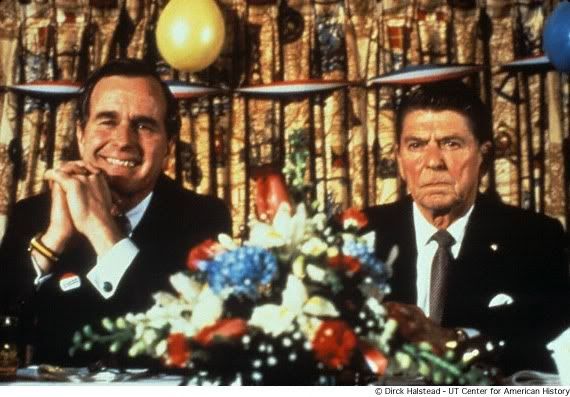
Guess who personally led the effort to reduce the number of examiners in favor of computerized monitoring?
BUSH GROUP'S PROPOSALS ON BANKING REGULATION
By EDWARD COWAN (NYT); Financial Desk
The New York Times
December 24, 1983, Saturday
Late City Final Edition, Section 1, Page 39, Column 5, 689 words
An Administration working group has agreed on a long list of changes meant to simplify Federal regulation of financial institutions, according to a statement from Vice President Bush's office. The group, which Mr. Bush heads, is striving to send recommendations for legislative proposals to President Reagan within weeks. The ...
SOURCE (sorry, no dinero for downloadin’ today):
http://select.nytimes.com/gst/abstract.html?res=FA0C1EFD3E5C0C778EDDAB0994DB484D81
Fraud: A kinder, gentler form of robbery.
quaker bill
(8,224 posts)Most of the vast pile of "troubled assets" purchased by the Fed to pump this new money out have now been sold. Once some level of confidence returned, significant portions were sold at a profit. Since then they have engaged in "operation twist" and "quantitative easing", in short, buying government debt and mortgage backed securities to keep the "money supply" large and interest rates low.
At some point this will end. The latest FOMC minutes suggest that if growth continues and unemployment falls as expected, this activity will stop later this year. At some point targets for growth, inflation, and unemployment decline will be exceeded. At this point the process will reverse and they will begin selling these assets back into the marketplace. This will basically pull the money back in and start undoing the mouse clicks.
Money supply is neither finite nor constant, and has not been for a very long time. The Fed expands and contracts it as one of the tools they have to manage the economy.
The tricky bit in this shell game is to keep the public believing that the little green pieces of paper have value, and a fairly stable value at that. This is the essential task we have given to the federal reserve, making sure that "money" has a roughly dependable and stable value. At a recent moment this apparently required extreme measures.
All of us have money, some of us alot more of it than others. However regardless of the size of your pile, you would be damaged by it becoming worthless. Obviously the wealthy benefit most from this because their piles are larger, but it is to everyone's benefit. Getting back at the wealthy by having their money evaporate comes with a very high personal cost in that your pile evaporates too. The better choice is to keep money stable, and then tax the wealthy heavily for the service.
TheKentuckian
(25,029 posts)Doing nothing encourages the pillaging.
The let them take and we take it back doesn't work, especially when all the tax dollars go to other (and indeed, the same) rich folks.
You are so worried bout your little pile that you ignore most of our piles shrink toward worthlessness in actual buying power to make those huge mounds larger.
You can't dismantle the real economy to seed the big pile folk's growth and expect it to come back to regular folks, that is just new pitch for the same old trickle down.
quaker bill
(8,224 posts)The point you are missing is the notion that the failure could have been allowed while restricting the damage to the rich. This is and was never the case. The collapse of a currency hits everyone. It actually could hit the rich less because they have the cash to diversify holdings internationally in many currencies. Most of us don't.
Letting the big guys fail was never really an option. Taxing them and then spending the money in a redistributive way is a viable option. We may not do it, but it could be done.
Hotler
(11,445 posts)the heads of the bankers rolled.
raouldukelives
(5,178 posts)Follow The Money
(141 posts)nt
MinM
(2,650 posts)came attached. Unfortunately, but predictably, there were no such strings attached to the bailout...
Even Goldman Sachs was borrowing money from the Federal Reserve through a private, kind of secret transaction that only came out recently. And so these financial experts say it's very likely the banks would've taken money with whatever strings came attached. And that might have been a way to hold the industry accountable, would have been to really impose major changes back then when they were begging on the taxpayers' door.

http://www.npr.org/2011/07/13/137789065/why-prosecutors-dont-go-after-wall-street
http://www.rigorousintuition.ca/board2/viewtopic.php?p=431303#p431303
